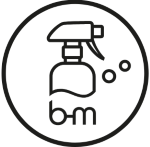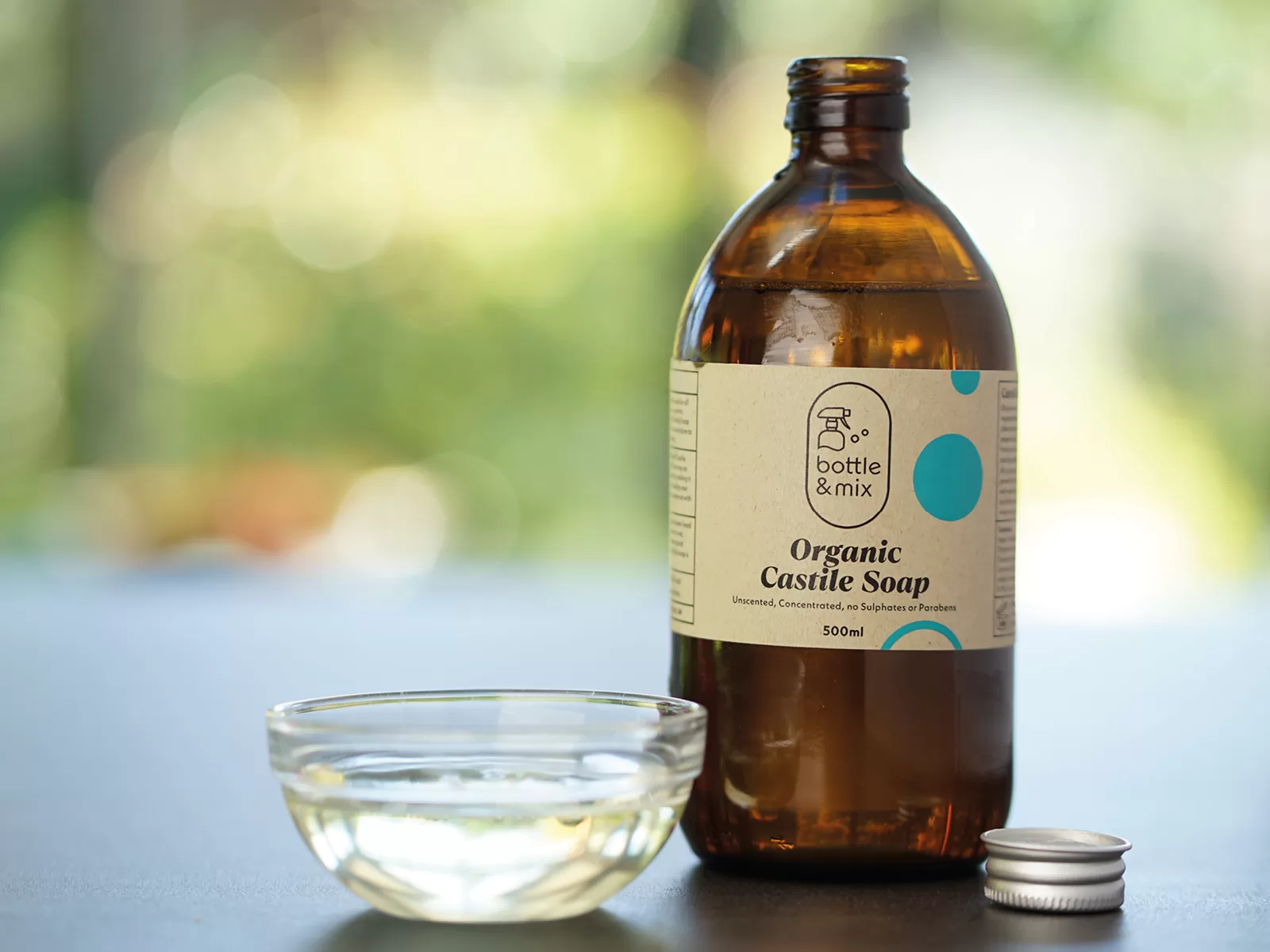A fresh, inviting scent can make any house feel like a home. Scents have a remarkable way of evoking comfort and nostalgia, turning ordinary cleaning routines into something that feels satisfying and familiar. But while that citrus-scented cleaner or floral air freshener might seem like the perfect touch, the truth behind artificial scents is far from rosy.
THE SECRET CHARM OF SCENTED CLEANERS
Scents play a significant role in our perception of cleanliness. While fragrances have no cleaning power and a truly clean home has actually no smell at all—just the absence of unpleasant odours caused by germs and dirt, companies add fragrances to their products.
For one simple reason: They boost sales. People choose products with pleasant scents, whether it’s a surface cleaner or a laundry detergent. Our sense of smell is closely linked to our limbic system, the part of the brain that controls memory and emotion. Manufacturers spend a fortune in scent branding, making customers associate ‘clean’ with their artificial fragrances and to connect with them emotionally. Artificial fragrances are widely used because they evoke strong, specific responses.(Trusted Source ![]() )
)
But have you ever wondered what’s behind that irresistible scent?
WHY ARE SYNTHETIC FRAGRANCES BAD?
Synthetic fragrances are very common in many household cleaning products, but they can be quite harmful to your health. These man-made scents often hide a mix of up to 200 chemicals, leading to potential skin irritation, hormone disruption, cancer, and environmental harm. One major concern is the lack of transparency; manufacturers aren’t required to reveal full ingredient lists, and fragrance formulas are protected as trade secrets, making it impossible to know what you’re exposed to.
Allergies and irritation are common side effects, with synthetic fragrances being the top allergens in consumer products.
Many synthetic fragrances contain harmful Parabens and Phthalates. Parabens disrupt hormones and accumulate in the body, while Phthalates are linked to cancer and respiratory diseases. Fragrances are often made from petroleum-based chemicals that can pollute indoor air, are non-biodegradable, and are toxic to aquatic life.
The key point: Manufacturers can legally include chemicals that are known carcinogens, allergens, endocrine disruptors, or neurotoxins in their products without informing consumers (Trusted Source ![]() )
)
NATURAL ALTERNATIVES TO ARTIFICIAL FRAGRANCES
There are simple, natural ways to keep your home smelling lovely without harming your health or the environment. You can enjoy a home that smells fresh and inviting without relying on synthetic fragrances. These natural options are better for your well-being and kinder to the planet.
1. Choose a safer cleaner
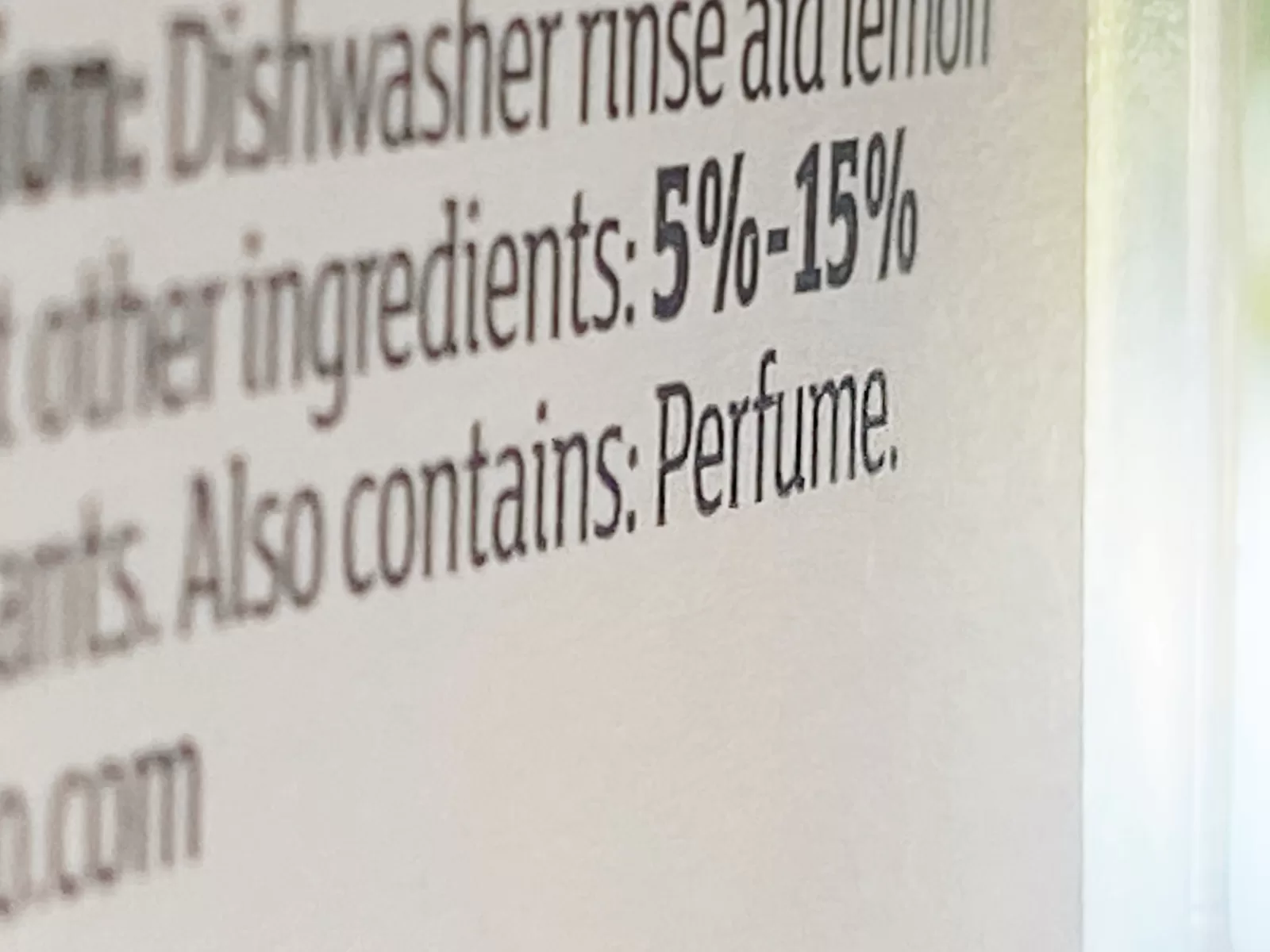
When shopping for (cleaning) products, choose ones with clear ingredient lists. Look out for terms like fragrance or perfume on the label; even products labelled as fragrance-free or unscented can still contain hidden fragrance chemicals. Steer clear of products listing fragrance or perfume without more details.
2. Go fragrance-free
Using unscented (cleaning) products and laundry detergents is a smart way to avoid the misleading “fragrance” loophole and allergens. Choosing fragrance-free products gives you full control over whether you’d like to add your own natural scent later on, or skip it entirely! Our natural cleaners, including our Castile Soap, are purposefully fragrance-free, giving you complete control.
3. Cleaning with Essential Oils
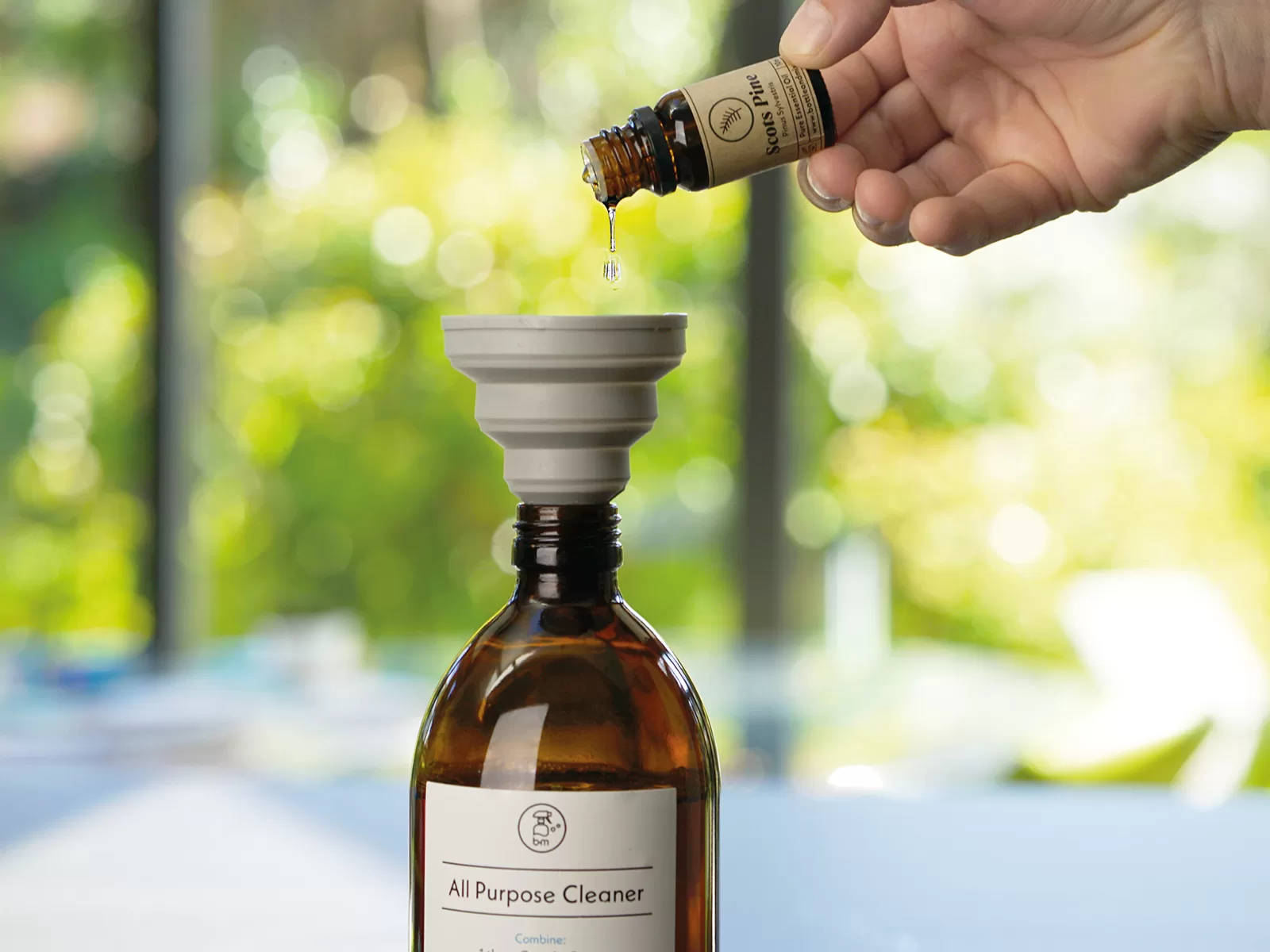
Scenting your home naturally by cleaning with Essential Oils rather than synthetic chemicals will reduce your daily exposure to harmful toxins. A few drops mixed with your natural cleaning solution will fill your space with a pleasant aroma. Read more further down in the article.
4. Bicarbonate of Soda for smells
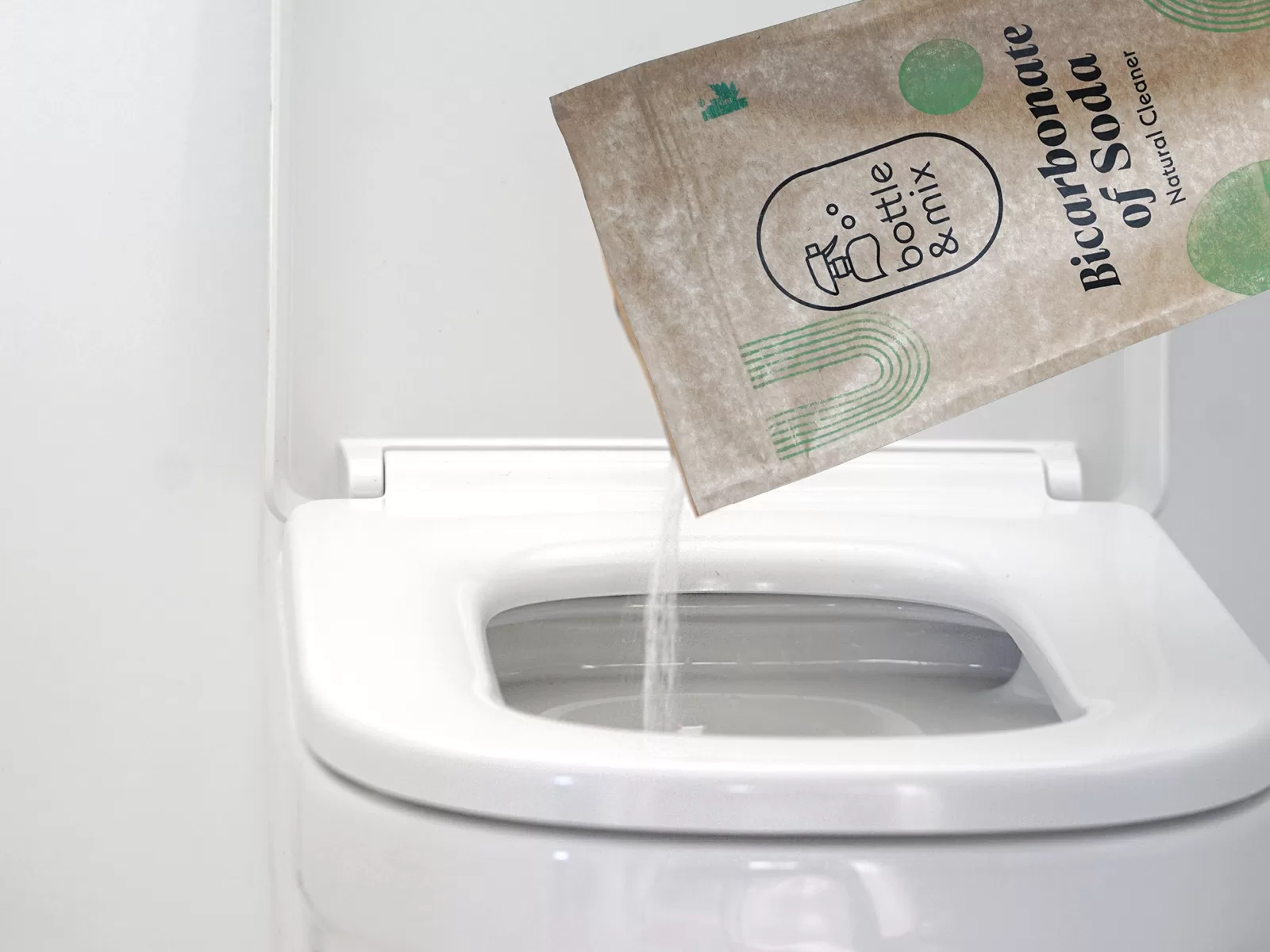
Unlike synthetic air fresheners, Bicarbonate of Soda doesn’t just cover up smells – it neutralizes them. Most household and laundry odours come from acidic substances like juice, tea, red wine, coffee, and milk. Alkaline cleaners like Bicarbonate of Soda effectively counteract these acids, balancing the pH (learn more about the chemistry behind it).
 Deodorize Cutting Boards
Deodorize Cutting Boards
 Deodorize Carpets and Shoes
Deodorize Carpets and Shoes
 Deodorize Sponges and Cloths
Deodorize Sponges and Cloths
 Toilet Cleaner and Deodorizer
Toilet Cleaner and Deodorizer
 Pet Bedding
Pet Bedding
 Toy Cleaner
Toy Cleaner
 Deodorize Stuffed Toys
Deodorize Stuffed Toys
 Deodorize the Fridge and Freezer
Deodorize the Fridge and Freezer
 Microwave Cleaner
Microwave Cleaner
 Dishwasher Cleaner and Deodorizer
Dishwasher Cleaner and Deodorizer
5. Open the windows
 Designed by Freepik
Designed by Freepik
Nothing beats fresh air to clear out lingering odours. Just 10 minutes a day with the windows open can do wonders for your home. It’s a simple, cost-free way to refresh your space.
6. Make a simmer pot
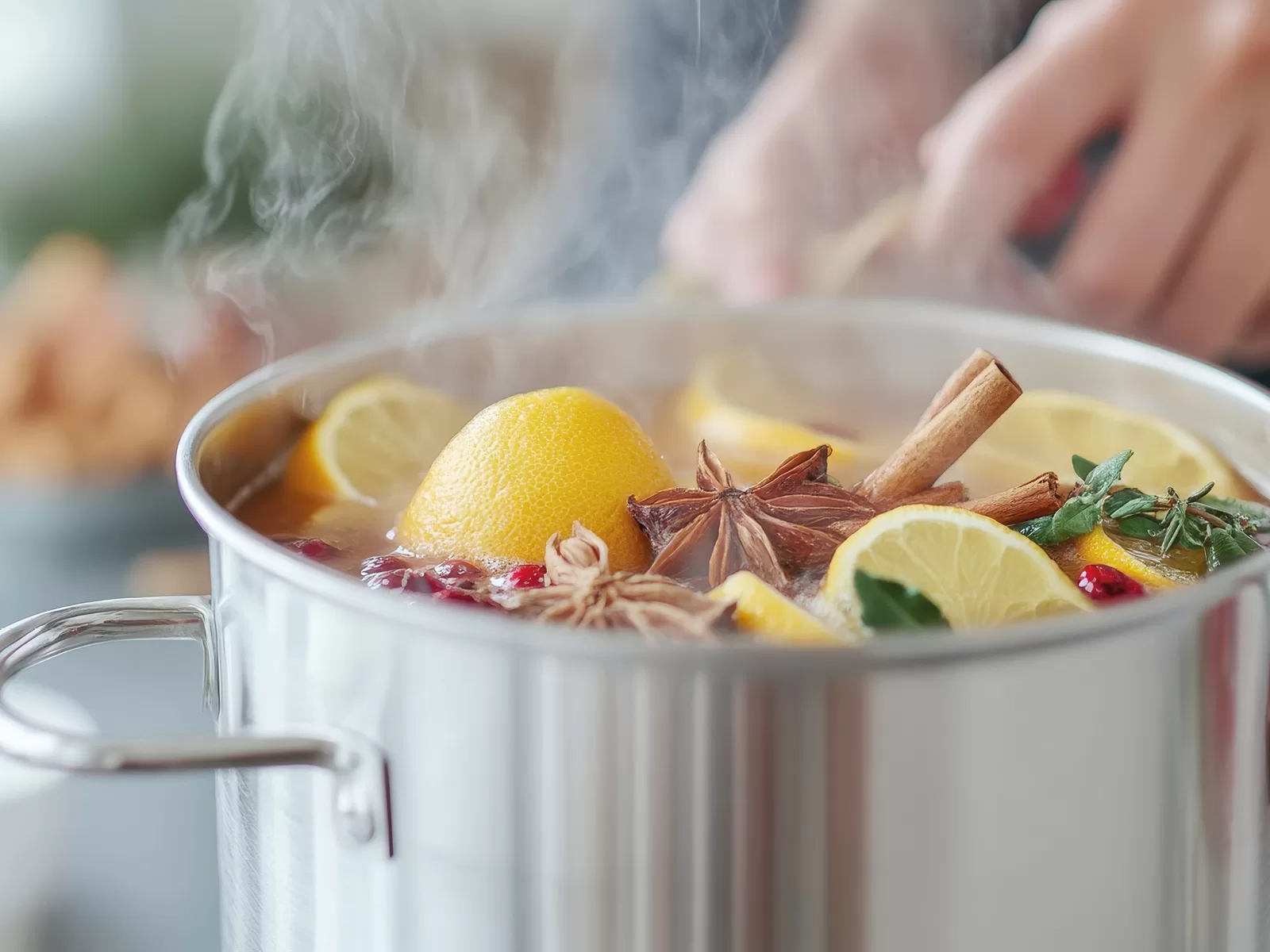 Details Stock photos by Vecteezy
Details Stock photos by Vecteezy
Create a natural, cosy scent by simmering herbs, spices, fruit, and Essential Oils in a pot of water. It’s a brilliantly simple way to fill your home with a warm and inviting scent. We’ll share some ideas with you further down in the article.
7. Scent your home naturally with plants
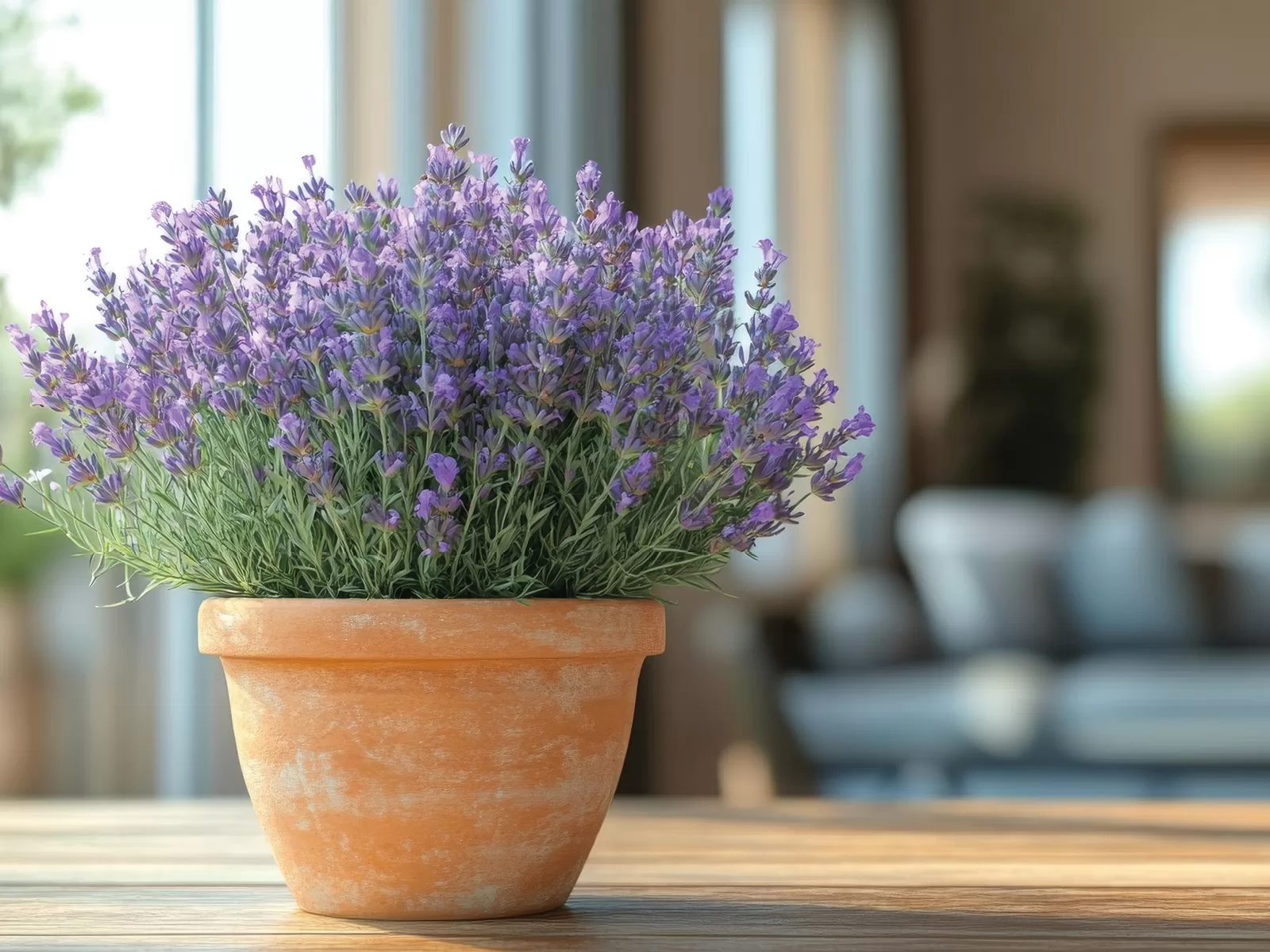 Table Stock photos by Vecteezy
Table Stock photos by Vecteezy
Grow herbs like basil, mint, rosemary, and oregano. Many fragrant flowering plants that are often seen in gardens can also flourish indoors or be brought inside when in full bloom. Indoor plants add a touch of charm, brighten up your home, lower your blood pressure and improve your well-being and cognitive function (Trusted Source ![]() ). Opt for subtle, light fragrances that don’t overwhelm—here are a few of our top picks.
). Opt for subtle, light fragrances that don’t overwhelm—here are a few of our top picks.
Add a delightful aroma to your home with flowering houseplants such as orange jasmine, gardenia, paperwhite, stephanotis, wax flower (Hoya), lavender, and gardenia.
8. Keep things clean and dry
 Clothespin Stock photos by Vecteezy
Clothespin Stock photos by Vecteezy
Dampness can be a big culprit when it comes to musty smells. Ensure areas like bathrooms and laundry rooms are well-ventilated and kept dry. Regularly cleaning surfaces and washing items like bedding, curtains, and cushion covers also helps to maintain a fresh and pleasant environment.
THE 10 BEST ESSENTIAL OILS FOR CLEANING
Using Essential Oils for cleaning can be a wonderful natural alternative to synthetic products. They not only smell amazing but also offer some impressive benefits—if you use them the right way.
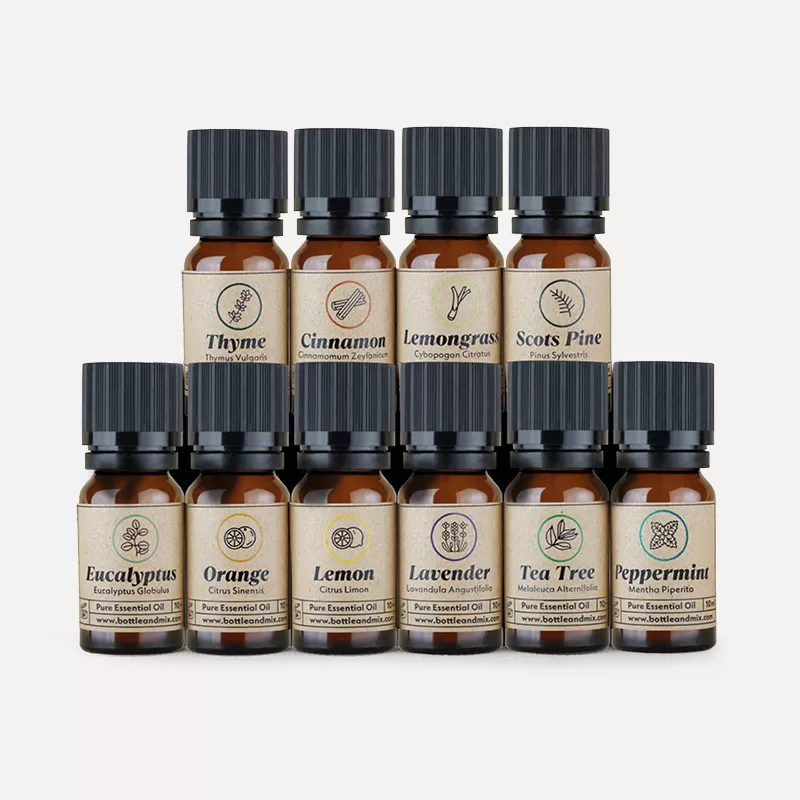
Why Essential Oils can be a better option for cleaning
![]() Non-toxic (if used correctly): Essential Oils are extracted from natural plants and contain no artificial chemicals like phthalates or formaldehyde, which are found in some synthetic fragrances.
Non-toxic (if used correctly): Essential Oils are extracted from natural plants and contain no artificial chemicals like phthalates or formaldehyde, which are found in some synthetic fragrances.![]() Antibacterial, antimicrobial, antiviral & antifungal properties: Different from fragrances that have no cleaning power, Essential Oils offer an eco-friendly way to fight harmful bacteria and microbes in your home (Trusted Source
Antibacterial, antimicrobial, antiviral & antifungal properties: Different from fragrances that have no cleaning power, Essential Oils offer an eco-friendly way to fight harmful bacteria and microbes in your home (Trusted Source ![]() ) Each of our carefully curated Best Essential Oils for Cleaning has its own unique, impressive qualities – from being anti-fungal, anti-microbial, anti-viral, and more. That’s why they’re the perfect natural addition for cleaning your floors, countertops, bathroom tiles and more.
) Each of our carefully curated Best Essential Oils for Cleaning has its own unique, impressive qualities – from being anti-fungal, anti-microbial, anti-viral, and more. That’s why they’re the perfect natural addition for cleaning your floors, countertops, bathroom tiles and more.![]() Pleasant, natural scent and proven therapeutic properties: Leaves a fresh smell without artificial perfumes. Multiple health benefits, primarily due to their antimicrobial and anti-inflammatory effects (Trusted Source
Pleasant, natural scent and proven therapeutic properties: Leaves a fresh smell without artificial perfumes. Multiple health benefits, primarily due to their antimicrobial and anti-inflammatory effects (Trusted Source ![]() )
)
 Cinnamon Essential Oil
Cinnamon Essential Oil
antibacterial, antifungal, antimicrobial
Extracted by steam distillation from the leaves and twigs of the Cinnamomum zeylanicum tree, Cinnamon Essential Oil boasts antimicrobial properties that serve as a natural defence against germs . Numerous studies (Trusted Source ![]() ) indicate that Cinnamon can eliminate up to 20 different types of bacteria, making it an effective cleaning agent and a natural home deodorizer.
) indicate that Cinnamon can eliminate up to 20 different types of bacteria, making it an effective cleaning agent and a natural home deodorizer.
Cinnamon Essential Oil Qualities:
Cinnamon Essential Oil is a powerful ally against mildew, mould, fungi, and a variety of other germs. Its potent deodorizing qualities make it a fantastic choice for freshening up your home. You can use it all around your living space to both disinfect and leave behind a delightful aroma. Just apply it to surfaces and floors to not only keep pests at bay but also to make your home smell inviting and cosy.
• Naturally antibacterial and antifungal benefits.
• Natural bug repellent
• Lush, festive, spicy, warm, woody sweet scent, uplifts your mood, boosts energy, and enhances focus and attention
Cautions:
Kid safe: yes, 10+
Cat safe: No
Dog safe: No
 Eucalyptus Essential Oil
Eucalyptus Essential Oil
antibacterial, antiviral, antimicrobial
Steam-distilled Eucalyptus Essential Oil is derived from the leaves and twigs of the Eucalyptus Globulus Tree. Eucalyptus not only has antiseptic and antimicrobial properties, but it also possesses anti-inflammatory properties (Trusted Source ![]() ). When used in the home, it can actually help alleviate seasonal allergies. It is also incredibly effective in combating mould and mildew. Research indicates that Eucalyptus can also combat bacteria responsible for influenza, pneumonia, staph infections, and strep throat.
). When used in the home, it can actually help alleviate seasonal allergies. It is also incredibly effective in combating mould and mildew. Research indicates that Eucalyptus can also combat bacteria responsible for influenza, pneumonia, staph infections, and strep throat.
Eucalyptus Essential Oil Qualities:
Eucalyptus Essential Oil tackles mould, alleviates allergies, and even keeps rats at bay. Not only does it eliminate existing mould and mildew, but it also helps prevent them from coming back in vulnerable areas like the shower, bathroom tiles, fridge shelves, and containers. Its robust scent will also banish musty odours. It also works wonders at removing sticky residues.
• Naturally antibacterial and antiviral
• Increases airflow to the lungs, relief from hayfever, boosts immunity
• Antiseptic
• Combats mould and mildew
• Minty, woody scent with citrus hints; soothing aroma that alleviates exhaustion, uplifts the mood and revitalizes the spirit.
Eucalyptus Essental Oil Cautions:
Kid Safe: yes, 10+
Do not apply close to the face
of very young children
Cat safe: No
Dog safe: No
 Lavender Essential Oil
Lavender Essential Oil
antibacterial, antifungal, antiviral
Steam-distilled from the herb’s iconic purple flower heads, Lavender Essential Oil possesses impressive antiviral (Trusted Source ![]() ) antibacterial and anti-odour qualities (Trusted Source
) antibacterial and anti-odour qualities (Trusted Source ![]() ). It effectively eliminates bacteria, viruses, and fungi, making it especially useful in damp environments such as bathrooms and kitchens. The soothing scent of Lavender not only cultivates a calming environment, ideal for bedrooms, but it also serves as a natural insect repellent, keeping mosquitoes, moths and more at bay.
). It effectively eliminates bacteria, viruses, and fungi, making it especially useful in damp environments such as bathrooms and kitchens. The soothing scent of Lavender not only cultivates a calming environment, ideal for bedrooms, but it also serves as a natural insect repellent, keeping mosquitoes, moths and more at bay.
Lavender Essential Oil Qualities:
Lavender Essential Oil is both powerful and safe, making it ideal for various cleaning purposes while leaving a calming and soothing scent. Use Lavender Essential Oil to cleanse your mattress and bed linens, as well as to disinfect toys. Lavender repels moths, fleas, flies, and mosquitoes and can even help prevent the growth of mould and mildew.
• Naturally possesses antibacterial qualities
• Keeps fleas, flies, mosquitoes, and ticks at bay
• Exhibits a powerful anti-inflammatory effect
• Effectively removes fungal growth from surfaces and fabrics
• Boasts a warm, floral scent that soothes the body and mind, aids sleep, and reduces stress
• Freshens up stale and mouldy odours
Cautions:
Kid Safe: yes, 2+
Cat safe: No
Dog safe: Yes
 Scots Pine Essential Oil
Scots Pine Essential Oil
antibacterial, antifungal, antiviral, antimicrobial
Distilled from the tree commonly known as pine, scientifically known as Pinus Sylvestris, Pine Oil is used in many popular cleaning products and for good reason. Not only is it incredibly effective at eliminating household germs such as yeast spores and E. coli, but it’s also highly efficient against mould and mildew . Many people prefer the fresh, clean scent of pine over lemon.
Scots Pine Essential Oil Qualities:
Pine Essential Oil not only tackles bacteria, pathogens, fungi, and yeast, but also banishes unpleasant odours, leaving your air clean and revitalized (Trusted Source ![]() ). Pine Essential Oil stands out as one of the best natural home deodorizers, making it ideal for eliminating odours from carpets, freshening up furniture, revitalizing your bathroom, or even deodorizing shoes.
). Pine Essential Oil stands out as one of the best natural home deodorizers, making it ideal for eliminating odours from carpets, freshening up furniture, revitalizing your bathroom, or even deodorizing shoes.
• Possesses natural antibacterial and antiviral qualities.
• Effectively removes fungal growth from surfaces and fabrics.
• Enhances the immune system, anti-inflammatory (Trusted Source ![]() ) and revives both mind and body.
) and revives both mind and body.
• Acts as an excellent deodorizer.
• Fresh scent of a lush green forest, fosters emotional well-being and overall wellness.
Scots Pine Essential Oil Cautions:
Kid Safe: yes, 2+
Cat safe: No
Dog safe: No
 Tea Tree Essential Oil
Tea Tree Essential Oil
antibacterial, antiviral, antifungal
Steam distilled from the leaves of the tree Melaleuca alternifolia, Tea Tree Essential Oil possesses excellent antibacterial, antifungal, anti-inflammatoryand antiviral characteristics thanks to its terpenoid content (Trusted Source ![]() ) . This potent oil is a powerful and safe cleaner that can destroy several common bacteria and viruses that cause illness, including E. coli, S. pneumoniae, and H. influenzae.
) . This potent oil is a powerful and safe cleaner that can destroy several common bacteria and viruses that cause illness, including E. coli, S. pneumoniae, and H. influenzae.
Tea Tree Essential Oil Qualities:
Tea tree Essential Oil is a fantastic ally for disinfecting surfaces, banishing mildew and musty smells, making it a wonderful addition to your daily cleaning routine throughout your home. Not only does it help to keep your living space fresh, but it also serves as a natural insect deterrent. This powerful Essential Oil is deadly to both larvae and adult house flies, can ward off ants, and even acts as an effective mosquito repellent.
• Naturally fights off bacteria and viruses.
• Keeps pests at bay.
• Effectively removes fungal growth from surfaces and fabrics.
• Strongly aromatic, medicinal, woody aroma, promoting coolness, clarity, and tranquillity.
Tea Tree Essential Oil Cautions:
Kid Safe: yes, 2+
Cat safe: No
Dog safe: No
Toxic when ingested
 Thyme Essential Oil
Thyme Essential Oil
antibacterial, antifungal, antiviral, antimicrobial
Steam-distilled Thyme Essential Oil is derived from the leaves and flowers of the thyme plant, scientifically known as Thymus vulgaris. One of the key advantages of Thyme Oil as a cleaning agent lies in its potent antimicrobial properties. It possesses agents like thymol and carvacrol, which have been found to be effective against a broad spectrum of bacteria and fungi, viruses, parasites and insects (Trusted Source ![]() ).
).
Thyme Essential Oil Qualities:
Thyme Essential Oil is especially handy in the kitchen and bathroom, where cleanliness is paramount. It is a formidable opponent against food-borne pathogens like Salmonella, making it perfect for sanitizing cutting boards and kitchen tools. It is also a natural deterrent for pests such as mosquitoes, fleas, lice, and bed bugs, safeguarding your clothing and furniture. Just a few drops can also keep moths and beetles at bay, ensuring your closet and kitchen remain secure and pest-free.
• Naturally fights off bacteria and viruses
• Acts as a natural pest repellent
• Effectively removes fungal growth from surfaces and fabrics
• Spicy, warm, and herbaceous aroma, it brings a sense of calm and alertness
• Rich in antioxidants, supporting the immune, respiratory, digestive, nervous, and other bodily systems
Thyme Essential Oil Cautions:
Kid Safe: yes, 10+
Cat safe: No
Dog safe: No
HOW TO USE ESSENTIAL OILS FOR CLEANING
 Essential Oils in DIY cleaning solutions:
Essential Oils in DIY cleaning solutions:
Always add Essential Oils last, after you‘ve added your cleaning liquids to the spray bottle. Since oil and water don’t mix well, make sure to shake your product thoroughly before each use.
For a gentle scent:
Add 5-10 drops of essential oils to 500 ml of cleaning solution.
For the properties of the oil to come through:
Add 10-20 drops in 500 ml of cleaning solution.
 Freshen up your laundry with Essential Oils:
Freshen up your laundry with Essential Oils:
Our Organic Wool Dryer Balls and Essential Oils make a perfect duo! Just add 2-3 drops of your chosen Essential Oil to each Dryer Ball for a light, fresh fragrance. If you prefer a more pronounced scent, you can use up to 5-6 drops, but starting with a smaller amount is often best. Allow the Dryer Balls to soak in the oil and dry completely before placing them into the dryer. Put the Dryer Balls in with your laundry and run your usual drying cycle. When you notice the scent fading, simply “refresh” your Dryer Balls with an extra 1-2 drops of Essential Oil.
 Deodorize Bins with Essential Oils:
Deodorize Bins with Essential Oils:
Start by sprinkling a spoonful of Bicarbonate of Soda into the bottom of your bin. Add a couple of drops of your favourite Essential Oil and some hot water. Give the mixture a good swish around, using a cloth or brush to tackle any stubborn grime. Rinse well and dry. Before lining the bin with a fresh bag, sprinkle a little more Bicarbonate of Soda and add a few extra drops of Essential Oil. This will keep unpleasant odours at bay for the long haul.
Things to keep in mind when using Essential Oils for cleaning
Of course, essential oils aren’t without their challenges. Here are a few things to keep in mind:
Some can be irritating: Especially citrus oils can cause allergic skin reactions when exposed to direct sunlight, potentially damaging skin cells. To avoid a photosensitive reaction, it’s best to refrain from applying oils labelled as photosensitive before you go out into the sun.
Safety around pets: Some oils can be toxic to cats, dogs and other pets. (Trusted Source
![]() ). Avoid using Essential Oils in cleaning recipes unless you have thoroughly researched the relative safety of the specific oil for your particular type of pet. Our oils include safety instructions for both dogs and cats. More safety information for Cats and Dogs.
). Avoid using Essential Oils in cleaning recipes unless you have thoroughly researched the relative safety of the specific oil for your particular type of pet. Our oils include safety instructions for both dogs and cats. More safety information for Cats and Dogs.
Use with caution around very young children.
Certain oils aren’t suitable to use around babies or very young children. Always follow safety instructions for the oils you choose to use.
Lastly, if you are pregnant or have certain health conditions, Essential Oils may not be the right choice. Always check with your doctor before using Essential Oils.
CREATE YOUR OWN SCENT
Add some fun and pleasant aromas that will not only freshen up your home but also elevate your mood! Whether you prefer to unwind with soothing aromas or rev up your energy with something zesty, you can customize your cleaning experience with Essential Oils that match the vibe of each room in your home. Mix and match to create your very own personalized scent, guaranteed to leave your home smelling fresh and clean. Here are some suggestions for combinations:





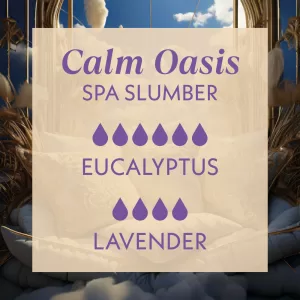
HOW TO MAKE A SIMMER POT
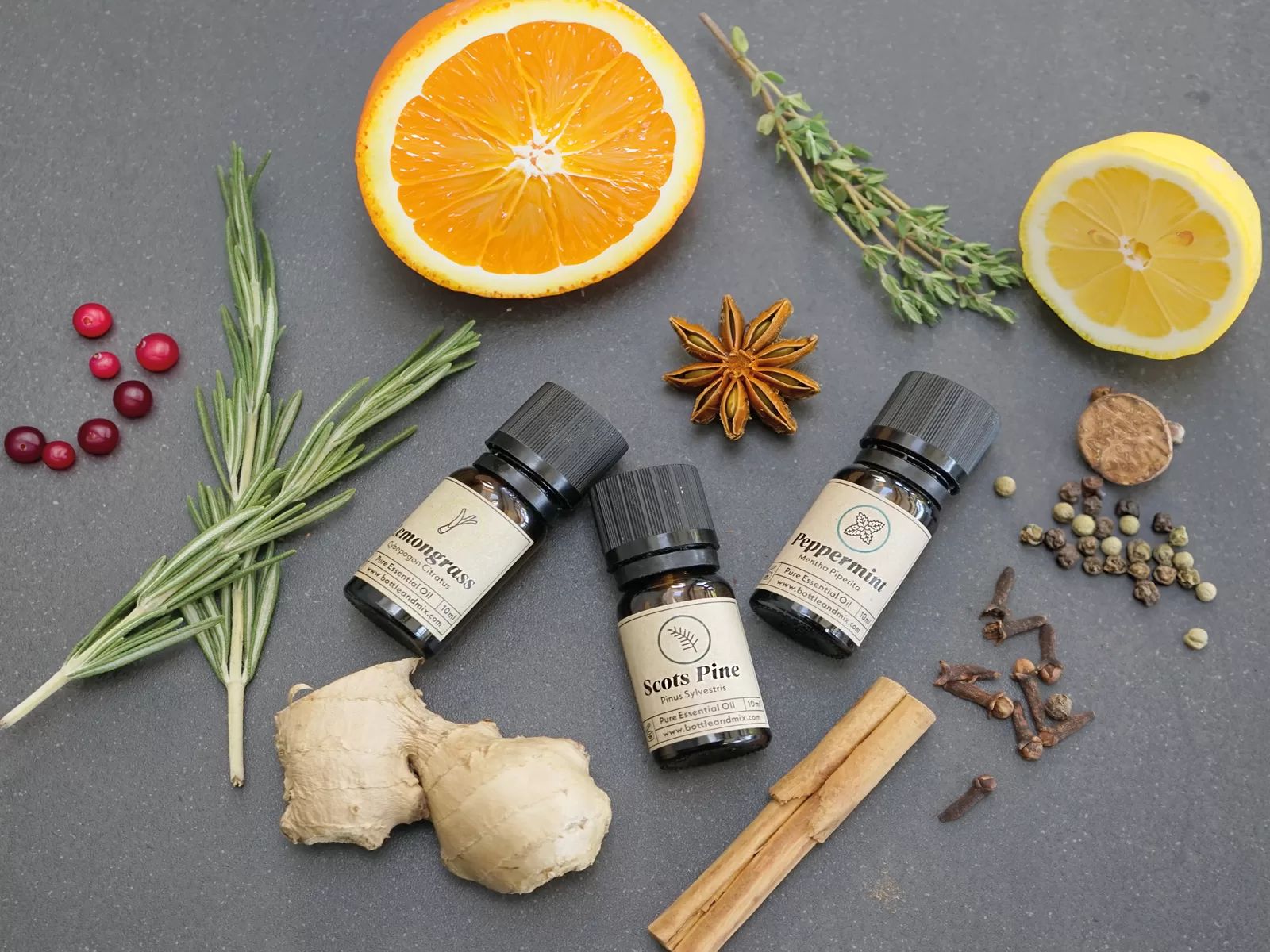
Creating a simmer pot is similar to cooking and a very natural DIY way to scent your home. Essentially you mix a selection of fresh fruits, herbs, spices, extracts or Essential Oils and gently simmers in water, spreading aromas throughout your living space.
Try to include at least one ingredient from each of the following categories:
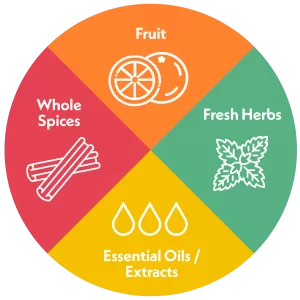
 Fruits:
Fruits:
Choose from oranges, lemons, apples, cranberries, or even berries like blueberries and strawberries. Citrus fruits offer a clean scent, while apples and cranberries provide a cosy aroma.
 Herbs:
Herbs:
Fresh herbs such as rosemary, thyme, ginger or oregano work well. You can also try softer herbs like mint or parsley, though they might not last as long.
 Spices:
Spices:
Opt for whole spices like cinnamon sticks, cloves, or star anise. These not only smell wonderful but also withstand simmering.
 Essential Oils/Extracts:
Essential Oils/Extracts:
You can enhance the scent with Essential Oils or Extracts like vanilla and almond.
Method
- Prepare your ingredients by slicing your chosen fruits (use one whole fruit like an orange or a couple of citrus fruits) and gather your herbs and spices. A couple of sprigs of fresh herbs or a tablespoon of dried herbs will do.
- Place your ingredients in a large, heavy pot. Add enough water to cover them, ensuring they float. Add some Essential Oils or Extracts to enhance the aroma.
- Set your stovetop to low heat and let the mixture simmer for about two hours. Keep an eye on the water level, topping up every hour if needed.
THE BOTTOM LINE: THE SAFEST WAY TO SCENT YOUR HOME
It doesn’t have to be all or nothing: A few tweaks here and there can go a long way.
We often don’t realise just how many scented products we use daily—washing-up liquid, floor cleaner, window spray, shower gel, shampoo, hair products, and more. Each one adds to the mix of fragrances in our home. Alone, by reducing the number of scented products, you can make a big difference. Think about where those products are being used too—do you want and need fragrances on surfaces that come into contact with food, or where children and pets play?
Choose fragrance-free products whenever possible and opt for cleaners that list all their ingredients so you know what you’re bringing into your home. If you want a lovely scent, try natural options like flowers and plants, Essential Oils, or dried herbs.
One simple way to keep your home smelling fresh is to remove unpleasant odours instead of masking them. Take the bins out regularly, dry everything you clean to remove moisture, open the windows for fresh air, and consider deodorizing with Bicarbonate of Soda. It’s a natural, effective way to freshen up without adding unnecessary chemicals.
We all love creating that warm, inviting feeling in our homes. You don’t have to sacrifice comfort to make a positive change, taking these small steps can help create a healthier, fresher home while still enjoying those cosy vibes.
